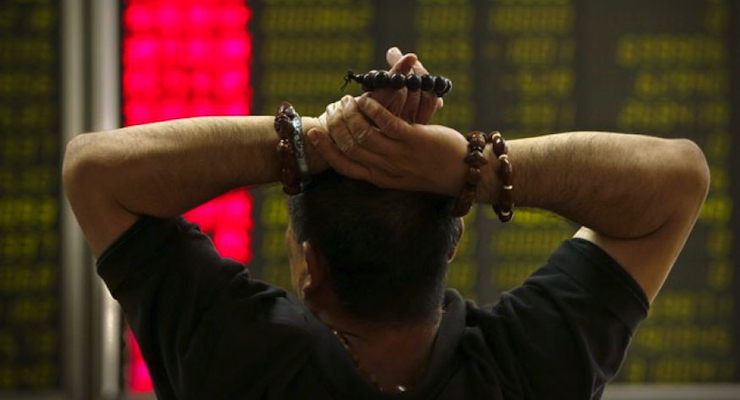

Aug. 24, 2015: A Chinese investor monitors stock prices at a brokerage house in Beijing. Stocks tumbled across Asia on Monday as investors shaken by the sell-off last week on Wall Street unloaded shares in practically every sector. (AP Photo/Mark Schiefelbein)
A former economic advisor to President Obama said “the dangers facing the global economy are more severe than at any time since the Lehman Brothers bankruptcy in 2008.” Lawrence Summers, an architect of the disappointing Obama stimulus bill known as The American Recovery and Reinvestment Act of 2009 (ARRA), fired off the warning shot in an op-ed in The Washington Post ahead of Friday’s meeting of the world’s financial policymakers in Peru.
“The problem of secular stagnation — the inability of the industrial world to grow at satisfactory rates even with very loose monetary policies — is growing worse in the wake of problems in most big emerging markets, starting with China,” wrote Summers, now a professor at and past president of Harvard University. This raises the specter of a global vicious cycle in which slow growth in industrial countries hurts emerging markets, thereby slowing Western growth further.”
Summers was treasury secretary from 1999 to 2001 and a key economic adviser to President Obama from 2009 through 2010, but returned to the academic community to study why the stimulus bill did not have the intended impact the administration had hoped and promised.
“Policymakers badly underestimate the risks of both a return to recession in the West and of a period where global growth is unacceptably slow, a global growth recession,” he added. “If a recession were to occur, monetary policymakers would lack the tools to respond. There is essentially no room left for easing in the industrial world.”
Still, despite what appears to be an argument against his old school of thought, critics of Keynesian economics would certainly argue Mr. Summers has not yet learned his lesson based on his prescription–ignore out-of-control debt and spend more money.
There are four contributing factors that lead to much lower normal real rates:
● First, increases in inequality — the share of income going to capital and corporate retained earnings — raise the propensity to save.
● Second, an expectation that growth will slow due to a smaller labor force growth and slower productivity growth reduces investment and boosts the incentives to save.
● Third, increased friction in financial intermediation caused by more extensive regulation and increased uncertainty discourages investment.
● Fourth, reductions in the price of capital goods and in the quantity of physical capital needed to operate a business — think of Facebook having more than five times the market value of General Motors.
“If I am wrong about expansionary fiscal policy and such measures are pursued, the risks are that inflation will accelerate too rapidly, economies will overheat and too much capital will flow to developing countries,” Summers said. “These outcomes seem remote. But if they materialize, standard approaches can be used to combat them.”
However, critics push back and argue that traditional measures aren’t available in the event of a debt crisis, which impacts confidence and liquidity. The International Monetary Fund reduced its forecasts released in 2012 for U.S. GDP in 2020 by 6 percent, for Europe by 3 percent, for China by 14 percent. For emerging markets, overall, IMF cut their projections by 10 percent and for the entire global economy by 6 percent. But, as Summers notes, these numbers cannot be trusted to project reality.
“These dismal figures assume there will be no recessions in the industrial world and an absence of systemic crises in the developing world,” Summers added. “Neither can be taken for granted.”




Patrick McCartney / October 8, 2015
Even Standard & Poors concluded that low wages are a drag on the economy. The nation’s financial elite have impoverished wage-earners over the past four decades, and a consumer economy cannot thrive when the average employee is unable to spend beyond bare subsistence.
/